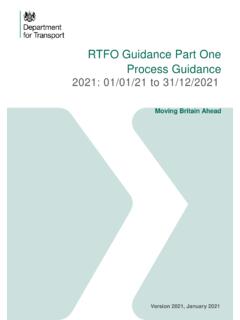Transcription of FACT SHEET: Diploma in Financial Accounting
1 FACT SHEET: Diploma in Financial Accounting Page 1 of 30 Qualification Diploma in Financial Accounting (Qualification code: HDIPFA2) Dip. ( Financial Accounting ) Prospectus 2022 Programme Category: Boston Undergraduate Programme SAQA ID 93597, NQF (HEQSF) Level 6, minimum Credits 374 Sixty percent (60%) of the total credits of this unique qualification are in the disciplines of Financial - and management- Accounting including taxation, internal auditing and public Accounting controls. This qualification is a Candidate for Accreditation with the Accreditation Council for Business Schools and Programs (ACBSP), United States of America. This qualification is also recognised by the Financial Services Board (FSB) as Generic under all Categories and Sub-Categories for occupational/professional purposes. The FSB is an independent institution, established by statute to oversee the South African non-banking Financial services industry in the public interest.
2 Minimum Entry Requirements A minimum requirement for admission into the Diploma is a: National Senior certificate (NSC), with English as one of the subjects passed and with endorsement for admission to Diploma studies; or National certificate (Vocational) (NC(V)), with English as one of the subjects passed and with endorsement for admission to Diploma studies; or Prior to 2009, Senior certificate with English as one of the subjects passed. Guidelines for Alternative Entry Pathways A number of higher education qualifications may meet the requirements for admission or advanced placement into the Diploma : certificate programme, NQF Level 5 (OQSF/HEQSF), minimum Credits 120; or Diploma programme, NQF Level 5 (OQSF), minimum credits 240; or Higher certificate , NQF (HEQSF) Level 5, minimum Credits 120; or advanced certificate , NQF (HEQSF) Level 6, minimum Credits 120; or Diploma , NQF (HEQSF) Level 6, minimum Credits 240 or 360; or an Equivalent qualification from an international higher education institution, see section on International Applicants below.
3 Important Notes for International Applicants See sections on Minimum Entry Requirements for International Applicants and Alternative Entry Pathways for International Applicants on page 9 of the Fact Sheet. Irrespective of meeting the Minimum Entry Requirements for International Applicants, international students who do not hold a South African school leaving certificate must present a Grade 12 equivalence verification with endorsement for admission to Diploma study from the South African Matriculation Board. The Board can be contacted on +27-(0)10-591-4401/2 or or visit Also, international applicants may be required to provide proof of proficiency in English (TOEFL score of 550, or IELTS overall band score of ) prior to admission to the qualification. Students who have qualifications from international higher education institutions must present an equivalence certificate from the South African Qualifications Authority (SAQA) who can be contacted on +27-(0)12-431-5070 or or visit Page 2 of 30 Applying to Transfer-in Credits Boston allows students with completed credits from recognised higher education institutions to apply for Credit Accumulation and Transfer (CAT).
4 In the case of completed qualifications, a maximum of 50% of the credits may be transferred-in. Credit transfers will only be considered if accompanied by full academic records with a statement of satisfactory or good conduct. Students interested in applying will be considered individually by the Academic Committee based at Head Office: see relevant section in the Prospectus and the Application for Admission Form online. Recognition of Prior Learning (RPL) Applicants Boston admits a small number of students through Recognition of Prior Learning (RPL). Applicants interested in applying through RPL will be considered individually by the Academic Committee based at Head Office; see relevant section in the Prospectus and the Application for Admission Form online. What is the Duration of Study? Based on the credits and notional hours of this qualification, the minimum duration is six (6) semesters over a period of three (3) years, and the maximum duration is nine (9) years.
5 For more information, see Table overleaf. What is the Purpose of the Qualification? Financial Accounting is an imperative component in commerce. The purpose of the qualification is to ensure that individuals are equipped with the knowledge, theory and methodology of the important disciplines in finance and Accounting . This enables them to demonstrate initiative and responsibility in a professional or academic context where application of the principles and theory are emphasised as a basis for entry into the labour market, professional training, graduate study, or professional practice in a wide range of careers within civil society, the public or private sectors, for example: Financial Accountant, Financial Manager Assistant Accountant, Accountant, Bookkeeper, Reconciliation Clerk, Creditors Clerk, Debtors Clerk, Management Accountant or Assistant Management Accountant Financial Services Officer or Financial Services Manager Internal Auditor, Company Secretary Credit Controller, Business Analyst Small Business Manager, Owner or Entrepreneur What are the Programme Outcomes?
6 On completion of the programme, graduates will have the necessary knowledge and practical skills required to: Operate effectively in the workplace using a number of Windows-based end-user applications. Apply Accounting functions and general business principles to real life situations and interpret economic realities of local and global communities. Develop knowledge and an understanding of the underlying principles and concepts relating to Financial Accounting and technical proficiency in the use of Accounting techniques. Demonstrate knowledge of the general legal framework, and of specific legal areas relating to business including the South African tax system as applicable to companies. Manage computerised Accounting and technology resources in organisations. Identify the socio-economic needs of society and display cultural sensitivity within organisations.
7 Page 3 of 30 What do I require to Pass a Module? Students will need an overall mark of fifty percent (50%) to pass a module. Students who do not achieve a pass mark in a summative assessment (SA1 and/or SA2) may be provided one (1) further opportunity to retake (supplement) the summative assessment at an additional re-assessment fee. How is the Overall Mark Calculated? The overall mark will be calculated from the student s performance on formative assessments (FAs) and summative assessments (SAs). What is the Curriculum and Fee? The Boston Diploma in Financial Accounting programme consists of twenty-five (25) compulsory modules. See Table overleaf. For students that have initially registered between 2014 and 2018, please see specific Curriculum at the end of the Fact Sheet. Please note that Module Fees listed in the Table are inclusive of an early-bird discount for the 2022 academic year and is only valid for accepted applicants who register before 1 January 2022.
8 Modules Fees escalate each calendar year, 2022 Module Fees to be announced for students who register in 2022. Prescribed textbooks are included in the fees. How many modules can I take each semester? The minimum is one (1) module per semester which will ensure that students remain academically active. The maximum number of modules you can take in any one (1) semester is dependent on the number of credits per module. It is recommended that full-time working adults consider completing the programme in a duration exceeding the minimum period of three (3) years, which implies electing to take fewer modules per semester. What are the assessment strategies? See Table overleaf for information on the assessment strategy per module and reference the key list below to read about each assessment strategy relevant to your programme, in detail.
9 Assessment Strategy C (ASC): Formative assessments (FA1 and FA2), also known as quizzes, will count fifty percent (50%) twenty five percent (25%) each - towards the overall mark. A summative assessment in the form of a final exam (SA1), will count fifty percent (50%) towards the overall mark. Due Performance (DP): This module is not weighted nor credit-bearing. However, the minimum hours required in continuous professional and career development must be completed before progressing to the next year of study or certification. It is vital that students in degree programmes develop greater breadth of understanding of interrelated disciplines and practices as mimicked in the world of work, and therefore participation in opportunities provided in this module is compulsory. A summative assessment in the form of reflective essay is required. Assessment Strategy 1 (AS1): The formative assessment 1 (FA1), formative assessment 2 (FA2), formative assessment 3 (FA3) and summative assessment 1 (SA1), all in the form of practical assessments, will each count twenty five percent (25%) towards the overall mark.
10 Assessment Strategy 2 (AS2): The formative assessment (FA1), also known as an assignment or test, will count fifty percent (50%) towards the overall mark. The summative assessment in the form of a final exam or capstone project (SA1), will count fifty percent (50%). Assessment Strategy 3 (AS3): The formative assessment (FA1), also known as an assignment or test, will count forty percent (40%) towards the overall mark. Summative assessments in the form of a final exam or capstone project (SA1), will count fifty percent (50%), and a research or reflective essay (SA2) will count ten percent (10%) towards the overall mark. Assessment Strategy 4 (AS4): Formative assessments (FA1 and FA2), also known as assignments or tests, will count forty percent (40%) - twenty percent (20%) each - towards the overall mark. Summative assessments in the form of a final exam or capstone project (SA1), will count fifty percent (50%), and a research or reflective essay (SA2) will count ten percent (10%) towards the overall mark.




